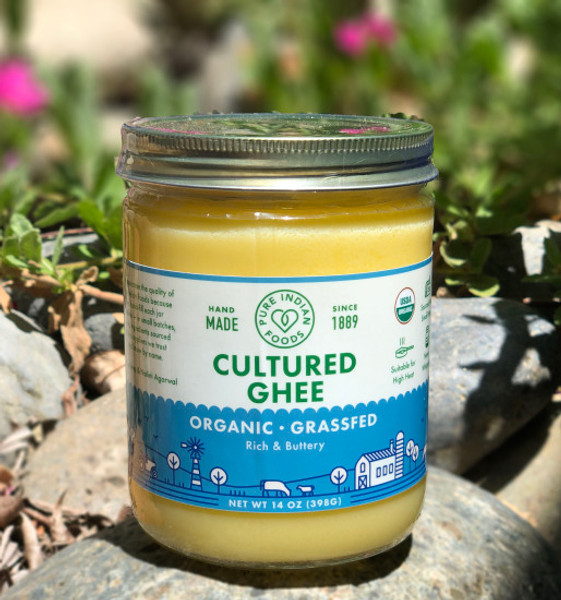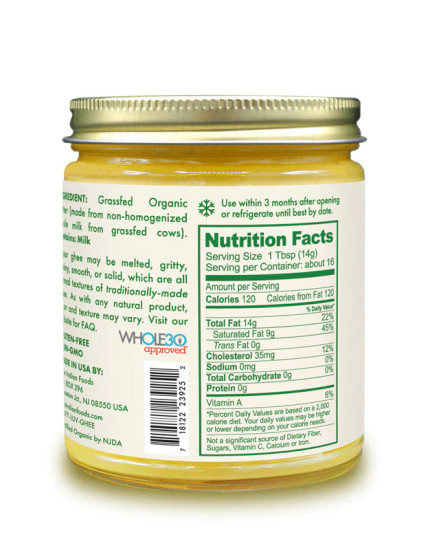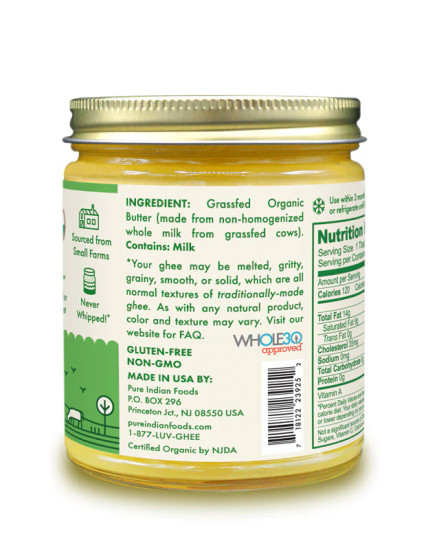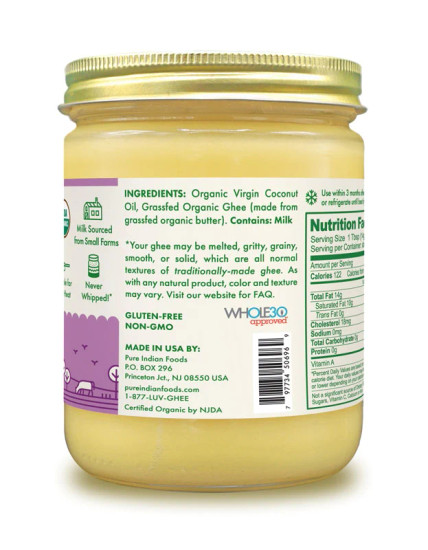Grass-fed & Certified Organic Cultured Ghee
This is the world's first grass-fed and certified organic cultured ghee! Ghee is one of the most sacred and healing foods described by the ancient Ayurvedic texts. It is made by a simple process of gently simmering cultured butter to remove potential allergens such as casein and lactose. What remains is the pure delicious butter oil, described as conferring good health and longevity.
One of the traditional processes of making ghee involves culturing the cream before churning it into butter and then clarifying it into ghee. Pure Indian Foods Organic Cultured Ghee is made by following this age-old and time-honored practice. The result is a delightfully aromatic grass-fed cultured ghee with a slight tangy flavor characteristic of naturally cultured foods. As always, Pure Indian Foods Organic Cultured Ghee is made from milk obtained only during the Spring through Fall when the cows are on the pasture eating fresh, green grass.
Pure Indian Foods Organic Cultured Ghee never contains any artificial ingredients or harmful trans-fats. It has a naturally high smoke point of 485 F, so it won't burn like butter. Use in place of oil or butter for cooking. This grass-fed cultured ghee is ideal for sauté, stir-fries, and sauces and it's delicious on rice, toast, pancakes, scones, or biscuits.
Why Cultured Ghee?
Milk contains lactose, a natural sugar that gives it that delicate sweet taste. For the body to break down lactose into its basic components of simple sugars called glucose and galactose, an enzyme called lactase must be present. Many people lack this valuable enzyme in their digestive system causing a common digestive problem known as lactose intolerance. In order to metabolize lactose, lactase must always be present. During the culturing process of milk or cream, lactose is converted into lactic acid. This makes for a much more digestible product for many people. Remember, generally ghee does not cause a problem with lactose intolerance. This is because, during the ghee-making process, the lactose is removed even if the butter used to make the ghee was not made from cultured cream. Cultured Ghee is known as Desi Ghee in India, where the word desi means prepared with indigenous method. Please note that this product is not a source of live and active cultures.
Key Features:
- Rich, buttery taste
- Grass-fed and Certified Organic
- Made in USA
- Gourmet quality - made using grass-fed cow's milk produced from Spring through Fall only
- Batch-tested gluten-free
- Packed in glass jars
- Made from a traditional Cultured Ghee recipe that has been used for thousands of years
Nutrition Facts
Serving Size: 1 Tbsp (14 g)
Serving per Container: 28
| Amount per Serving | % Daily Value* | |
|---|---|---|
| Calories | 120 | |
| Calories from Fat | 120 | |
| Total Fat | 14 g | 22% |
| Saturated Fat | 9 g | 45% |
| Trans Fat | 0 g | |
| Cholesterol | 35 mg | 12% |
| Sodium | 0 g | 0% |
| Total Carbohydrates | 0 g | 0% |
| Protein | 0 g | 0% |
| Vitamin A | 0 g | 6% |
* Percent Daily Values are based on a 2,000 calorie diet. Your daily values may be higher or lower depending on your calorie needs.
Not a significant source of Dietary Fiber, Sugars, Vitamin C, Calcium or Iron.
Ingredients: Organic Pasteurized Cultured Butter. Contains: Milk (made from non-homogenized whole milk from grass-fed cows)
No GMOs, No Added Salt, No Preservative, No Trans Fats.This product is batch-tested to contain less than 0.25% lactose, less than 2.5 ppm milk proteins (casein and whey) and less than 5.0 ppm gluten
Store in cool, dry and dark place. Use a clean and dry spoon to take ghee out of the jar. Use within 3 months after opening or refrigerate until the Best By date. As with any natural products, color and texture may vary.
Frequently Asked Questions
Q. Do I need to refrigerate the ghee?
A. A well-prepared ghee has very little moisture content and it is shelf-stable. You do not need to refrigerate it for 2-3 months if you keep it in an airtight container. This makes it suitable to carry while traveling or camping. When kept in refrigerator, ghee can last up to a year. Ghee will harden in the refrigerator and it will become softer again when you leave it for some time at the room temperature. It is best to protect ghee from light, air and moisture.
Q. If I intend to consume my ghee within 2 months then what is the best place to store it?
A. In this situation, it is best to store the ghee jar in your kitchen cabinet (away from the light).
Q. How do I handle the opened jar?
A. Use a clean and dry spoon. Close the lid as soon as possible. Do not let any moisture get into your ghee jar. It can promote bacteria and spoil the ghee.
Q.I noticed that the texture is grainy rather than smooth. Is this a problem?
A.The conventional store-bought ghee has a very uniform, smooth, highly consistent texture, almost like butter. However, a well-prepared ghee should have a grainy, lumpy texture. This lovely grainy texture is a quality of our ghee and is not at all a problem. Here is our tagline for a grainy ghee: No grains to get grainsWe believe the quality of butter is the most important factor to get a grainy texture. A 100% grass-fed butter yields good grains. A low heating temperature and careful process of making are also important.
Q.Can I use the ghee after the "expiration" date?
A.Ghee has a sweet flavor. An unopened jar can be safely used after the "Best Used By" date as long as there is no noticeable change in the flavor. Aged ghee is considered to have healing properties. Some families in India have ghee which is over 100-year old. Such an old ghee is rare and is very expensive.
Q.Is ghee considered dairy?
A.Yes, ghee is made from milk and hence it is a dairy-product. However, people who have dairy intolerance can generally consume ghee since ghee does not have casein (a type of milk protein) and lactose (milk sugar) which some people find difficult to digest.
Q.Is your ghee certified kosher?
A.Our ghee is not certified kosher though consideration for kosher certification is possible in the future. Please note that butter is the only ingredient in our ghee and it is certified organic and certified kosher butter. It is prepared in a clean commercial facility with all the required licenses.
Q.Do you use salted or unsalted butter for preparing ghee?
A.We only use unsalted butter.
Q.Should ghee be hard or runny?
A.Ghee contains both hard and runny parts at room temperature. It becomes completely solid when you refrigerate it. If you like to use ghee as a spread then it may be a good idea to keep some in the refrigerator for this purpose.
















